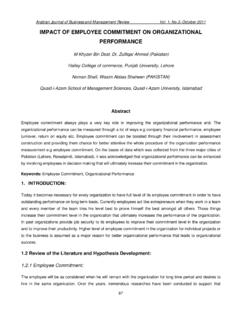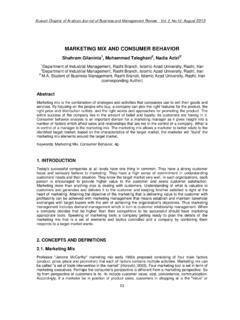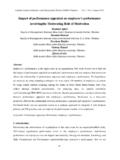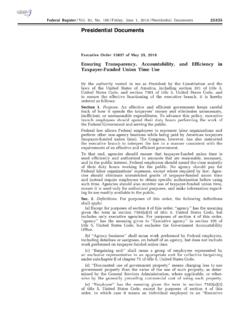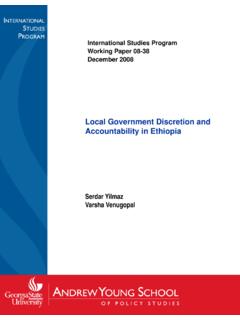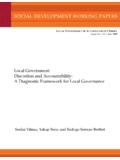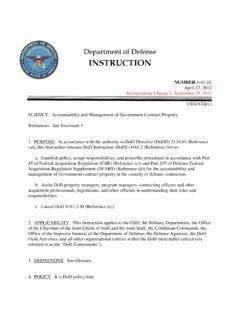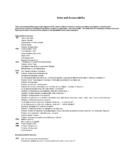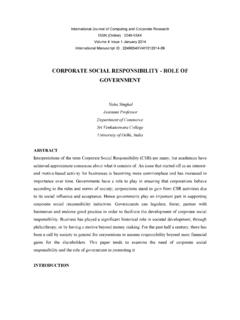Transcription of ACCOUNTABILITY AND PUBLIC SECTOR FINANCIAL …
1 Arabian Journal of Business and management Review (OMAN Chapter) Vol. 1, ; January 2012. ACCOUNTABILITY AND PUBLIC SECTOR FINANCIAL management IN nigeria . BY. ONUORAH, ANASTASIA CHI-CHI. DEPARTMENT OF ACCOUNTING, BANKING & FINANCE. FACULTY OF management SCIENCES, DELTA STATE UNIVERSITY, ASABA CAMPUS, nigeria . &. APPAH, EBIMOBOWEI (corresponding author). DEPARTMENT OF ACCOUNTING, FACULTY OF BUSINESS EDUCATION. BAYELSA STATE COLLEGE OF EDUCATION, OKPOAMA BRASS-ISLAND, YENGOA, nigeria . ABSTRACT. nigeria is the sixth largest producer of oil and gas in the world, but the average Nigerian on the street is poor and there is poor infrastructure like power supply, roads, hospitals etc. This study examines the management of PUBLIC funds in terms of how PUBLIC office holders give ACCOUNTABILITY report of their stewardship. Data on total federal government revenue and expenditure, state governments' revenue and expenditure were collected from Statistical bulletin from the Central Bank of nigeria from 1961-2008.
2 The results were analysed using relevant statistical tools. The findings reveals that the level of ACCOUNTABILITY is very poor in nigeria because the attributes of accessibility, comprehensiveness, relevance, quality, reliability and timely disclosure of economic, social and political information about government activities are completely non available or partially available for the citizens to assess the performance of PUBLIC officers mostly the political office holders. On the basis of these, the paper recommends among others that for ACCOUNTABILITY to be successful in the management of PUBLIC funds in nigeria there must be a reduction in the level of corruption, improving PUBLIC SECTOR accounting and auditing standards, legislators as champions of ACCOUNTABILITY and restructure the PUBLIC accounts committees and the value of money must be applied in the conduct of government business. Keywords: ACCOUNTABILITY , PUBLIC finance, PUBLIC SECTOR Accounting, management , nigeria .
3 INTRODUCTION. 1. Arabian Journal of Business and management Review (OMAN Chapter) Vol. 1, ; January 2012. The Nigerian society is filled with stories of wrong practices such as stories of ghost workers on the pay roll of Ministries, Extra-ministerial Departments and Parastatals, frauds, embezzlements and setting ablaze of offices housing sensitive documents and corruption are found everywhere in the country (Okwoli, 2004). According to Bello (2001), huge amount of Naira is lost through one FINANCIAL malpractice or the other in nigeria , which to say the least, drains the nation's meager resources through fraudulent means with far-reaching and attendant consequences on the development or even socio-economic or political programmes of the nation. Billions of Naira is lost in the PUBLIC SECTOR every year through fraudulent means. This represents only the amount that is ferreted out and made PUBLIC . Indeed much more substantial or huge sums are lost in undetected frauds or those that are for one reason or the hushed up.
4 Appah and Appiah (2010) argues that cases of fraud is prevalent in the Nigerian PUBLIC SECTOR that every segment of the PUBLIC service, could seem to be involved in one way or the other in some of these nasty acts. The bane of PUBLIC SECTOR FINANCIAL mismanagement in nigeria since the oil boom years a period under which there existed structurally weak control mechanism, which create a variety of loopholes that have tended to facilitate and sustain, corrupt practices. This is coupled with the fact that there is a near total absence of the notion and ethics of ACCOUNTABILITY in the conduct of PUBLIC affairs in the country (Bello, 2001). Tanzi (1999) noted that good governance is essential part of a framework for economic and FINANCIAL management which includes: macroeconomic stability; commitment to social and economic equity; and the promotion of efficient institutions through structural reforms such as trade liberalization and domestic deregulation. Poor governance may result from factors such as incompetence, ignorance, lack of institutions, the pursuit of economically inefficient ideologies, or misguided economic models.
5 It is often linked to corruption and rent seeking. Okoh and Ohwoyibo (2009) opine that ACCOUNTABILITY reflects the need for government and its agencies to serve the PUBLIC effectively in accordance with the laws of the land. Appah (2010). point out that with the number and monetary value of PUBLIC SECTOR activities has increased substantially. This increase in activities has brought with it an increased demand for ACCOUNTABILITY of PUBLIC officers who manage these activities of the PUBLIC . Achua (2009) says serious consideration is being given to the need to be more accountable for the often vast amounts of investment in resources at the command of governments, which exercise administrative and political authority over the actions and affairs of political units of people. Government spending is a very big business and the PUBLIC demands to know whether the huge outlays of money are being spent wisely for PUBLIC interests . ACCOUNTABILITY is a fundamental value for any political system.
6 Citizens should have the right to know what actions have been taken in their name, and they should have the means to force corrective actions when 2. Arabian Journal of Business and management Review (OMAN Chapter) Vol. 1, ; January 2012. government acts in an illegal, immoral, or unjust manner (Peters, 1999). ACCOUNTABILITY is also important for government. It provides government with the means of understanding how programs may fail and finding ways that can make programmes perform better. Kaufman (2005) argues that an emphasis on ACCOUNTABILITY by citizens is one aspect of the growing emphasis on eliminating corruption and promoting transparency in government. However, the issue of ACCOUNTABILITY in nigeria is a fundamental problem because of the high level corruption in all levels of government in the country. The Transparency International global Corruption Perception Index in October 2010 ranked nigeria 134 from its 130 position in 2009 and 121 in 2008. The 2010 CPI, drawn on a scale from 10 (highly clean) to 0 (highly corrupt), showed that nigeria scored , and is ranked 134 amongst the 178 countries surveyed.
7 This fearful situation of nigeria 's lack of FINANCIAL ACCOUNTABILITY in the PUBLIC SECTOR provided the need for this paper. Therefore, the objective of this paper is to examine the ACCOUNTABILITY of PUBLIC officers in the management of the FINANCIAL resources of the country and means of achieving an accountable and transparent society like that of Denmark, New Zealand and Singapore that ranked first in the 2010 CPI with scores of CONCEPTUAL AND THEORETICAL FRAMEWORK. The Concept of ACCOUNTABILITY ACCOUNTABILITY is all about being answerable to those who have invested their trust, faith, and resources to you. Adegite (2010) defined ACCOUNTABILITY as the obligation to demonstrate that work has been conducted in accordance with agreed rules and standards and the officer reports fairly and accurately on performance results vis- -vis mandated roles and or/plans. It means doing things transparently in line with due process and the provision of feedback. Johnson (2004) says that PUBLIC ACCOUNTABILITY is an essential component for the functioning of our political system, as ACCOUNTABILITY means that those who are charged with drafting and/or carrying out policy should be obliged to give an explanation of their actions to their electorate.
8 Premchand (1999) observed that the capacity to achieve full ACCOUNTABILITY has been and continues to be inadequate, partly because of the design of ACCOUNTABILITY itself and partly because of the widening range of objectives and associated expectations attached to ACCOUNTABILITY . He further argues that if ACCOUNTABILITY is to be achieved in full, including its constructive aspects, then it must be designed with care. The objective of ACCOUNTABILITY should go beyond the naming and shaming of officials, or the pursuit of sleaze, to a search for durable improvements in economics management to reduce the incidence of institutional recidicism. The future of ACCOUNTABILITY consists in covering the macro aspects of economic and FINANCIAL sustainability, as well as the micro aspects of service delivery. It should envisage a three-tier structure of ACCOUNTABILITY : that 3. Arabian Journal of Business and management Review (OMAN Chapter) Vol. 1, ; January 2012. of official (both political and regular civil employees), that of intragovernmental relationships and that between government and their respective legislatures.
9 According to Coker (2010), the various approaches to ACCOUNTABILITY based on the language of account can be grouped into: (1) Process Based ACCOUNTABILITY : This approach measures compliance with pre set standard and formally defined outcomes. This includes fiscal and managerial ACCOUNTABILITY with reliance on the use of accounting methodologies. (2). Performance Based ACCOUNTABILITY : This approach measures performance against broad objectives. This measure may be qualitative and the criteria against which performance is measured less precisely defined. Adegite (2010) also noted that there are three pillars of ACCOUNTABILITY , which the UNDP tagged ATI ( ACCOUNTABILITY , Transparency and Integrity). ACCOUNTABILITY which is segmented into: (1) FINANCIAL ACCOUNTABILITY : The obligation of any one handling resources, PUBLIC office or any other positions of trust, to report on the intended and actual use of the resources or of the designated office. (2) Administrative ACCOUNTABILITY : This type of ACCOUNTABILITY involves a sound system of internal control, which complements and ensures proper checks and balances supplied by constitutional government and an engaged citizenry.
10 These include ethical codes, criminal penalties and administrative reviews. (3). Political ACCOUNTABILITY : This type of ACCOUNTABILITY fundamentally begins with free, fair and transparent elections. Through periodic elections and control structure, elected and appointed officials are held accountable for their actions while holding PUBLIC office. (4) Social ACCOUNTABILITY : This is a demand driven approach that relies on civic engagement and involves ordinary citizens and groups exacting greater ACCOUNTABILITY for PUBLIC actions and outcomes. Table 1 below shows the content of ACCOUNTABILITY : General ACCOUNTABILITY Fiscal ACCOUNTABILITY Managerial ACCOUNTABILITY Answerability for Approval of policies Appropriate rules are action. and actions having observed and that the Sanctions where FINANCIAL implications authority is not justification is not by a representative abused. adequate. body. Risks are taken within Ability to revoke a Approval of an annual delegated powers to mandate.


